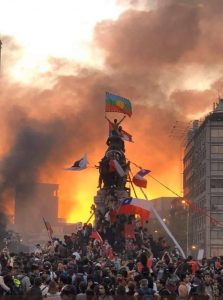Prioritizing Equity Means Addressing Injustice of Monoculture Tree Plantations
Recent events in Chile have forced a withdrawal of the upcoming United Nations climate meetings in Santiago de Chile. In a fully unexpected convulsion of street action and spontaneous mass protest, the nation of Chile has passed from being a global symbol celebrating corporate globalization and economic modernity into a bonfire of a disturbance at the centre of a continent-wide fever of social unrest. In little more than a week, the actions in Chile progressed from an animated and aggressive student protest against subway fare hikes to a nationwide mobilization demanding structural changes in what is one of the most economically unequal societies on the planet. There is no indication that the protest movement is subsiding.
This unrest in Chile, the international pressure highlighting concerns about human rights abuses, and the subsequent attempt by the Chilean government to control the fallout and by renouncing the offer of hosting COP 25 has taken the global climate policy establishment by total surprise. No one thought that in the weeks immediately previous to international climate meetings Chile would enter an unprecedented phase of political action dedicated to exposing the erroneous assumptions underpinning the glitter and shine facade of a predatory economic model.

Plans for holding the United Nations Framework Convention on Climate Change 25th Conference of Parties in Santiago de Chile only arose because of the ultra-right-wing climate-denying Bolsonaro regime in Brazil discarding their opportunity to hold the COP 25. Holding COP 25 in Santiago de Chile was received as an exciting solution by the United Nations. Current Chilean President Sebastian Piñera, a billionaire himself and always the salesman, who was looking for another opportunity to sell the world on the Chilean economic miracle, proposed the option.
And, “why not?” thought the global economic elite that controls the UNFCCC process.
Chile is, after all, a country that has long been held up as a success story for the new global economy, the “tiger” of Latin America. Holding COP 25 in Santiago de Chile, a planetary capital of free-market ideology, was going to be an opportunity to highlight the future of market-based climate policy and the supposed role of the private sector in raising “ambition” for climate “action.”
Yet, the harsh reality of a free market economic system that benefits a miniscule elite with immeasurable wealth while relegating multitudes of vulnerable and marginalized communities to a permanent state of precariousness raised it’s head and upended not only normality in Chile, but also in the UNFCCC process.
Chile is now living its most serious political crisis in decades, since the departure of the military government in 1990. A ‘state of exception’ was declared, a curfew implemented in many regions throughout the length of the country, and the military was called into the streets of a nation understandably traumatized by the violence of an unrepentant military dictatorship.

Though the government has rescinded the curfew and emergency, police and army troops have been indiscriminate in their use of violence against the people on the streets. Thousands of people have been detained, hundreds of people have been shot and injured, and at least 20 people have died, including fatalities attributed directly to the repressive actions of the authorities. The United Nations has sent a mission to Chile to investigate the hundreds of reports of human rights allegations, which include the torture and sexual assault of detainees.
The Chilean people responded to the violence and the suspension of their basic rights by coming out in droves on Friday Oct 25 in what was by far the largest street demonstration in the history of the country, with as many as 1.5 million people filling the main boulevard of Santiago demanding structural changes to address severe economic inequity and the injustice of a political constitution written and established during the military government.
Front and centre to this historic uprising are the demands of those communities, especially the indigenous Mapuche peoples of the south of the country, who are living on a daily basis with environmental injustice. For the Mapuche nation, the reversal of the land grabbing and usurpation of territory perpetuated by the highly monopolized monoculture tree plantation industry is one of the central claims to their demands for structural change. It is this festering sore of environmental injustice and how COP25 would respond to inequity that was raised to a level of importance that would have been nearly impossible without this organic uprising in Chile against a predatory economic model.
Hosting COP25 in Chile was from the moment it was announced a concern for communities, in Chile and around the world, that advocate bringing an end to the ecological destruction and cultural genocide that are embedded in the exotic tree species plantation model. Communities were facing head-on the dilemma of whether COP25 would be leveraged to greenwash inequality in Chile and elsewhere by not only ignoring the realities on the ground of the “green desert” of the destructive monoculture plantation model, but in actually advancing policy that would perpetuate and further expand this model as a climate “solution.”
The sad truth is that due to the incessant policy and rhetorical focus on “natural climate solutions,” and the prevalence of “markets-based mechanisms” embedded in Article 6 of the Paris Agreement, there are still many indications from the global climate establishment that exotic tree species plantations are considered a climate solution – contesting these perverse assumptions about monoculture tree plantations was going to be an imperative for civil society engaging with COP25 and parallel activities.
The uprising in Chile has now raised the issue of equity and social justice in the UNFCCC process to a level that would have been impossible in status-quo conditions. In that sense the recent “despertar” (awakening) in Chile could very well be the best thing that could have ever happened for affected communities to hold COP25 accountable, as the question of equity was increasingly nested in the question of whether or not the social unrest made holding the COP25 in Santiago de Chile a viable option.
It was untenable that holding COP25 in Chile would be used to “greenwash” the recent human rights abuses of the current government of Chilean President Sebastian Piñera. It was also untenable to consider holding COP25 in Santiago de Chile if the rights to free speech, movement and assembly were at risk because of so-called “security” concerns. If COP25 were to be held in Santiago in this political moment there were going to have to be strict guarantees that civil society and especially the communities of Chile that are subject to environmental racism and climate injustice were to be allowed to gather, organize and protest freely.

Equity cannot be a word that is thrown about with carelessness and as a rhetorical tool to disguise the business as usual tendencies of climate agreements that still sell the world on exotic tree species plantations as a “natural climate solution.”
Chile has set the standard now with the society-wide organic awakening against inequality and environmental injustice. In the spirit of this moment, it became evident that hosting COP25 in Santiago would have required that the proceedings respond to the growing demands of Chile and the rest of the world that true climate action must be centred on equity. Anything less is window dressing.
Will the decision to not hold COP25 in Chile further isolate the UNFCCC process from the affected communities who are the most active in holding the climate talks accountable on questions of climate justice? Is the global climate establishment prepared to rise to the occasion?
The next days, weeks and months will determine to what extent equity is truly a cornerstone in global climate action and to what extent the defence of human rights is considered a top-level priority – or if indeed the UNFCCC process really is designed to protect business as usual under the guise of global climate diplomacy.
Without a doubt, the recent unrest in Chile has had a huge role in elevating these questions of justice to their rightful place of being front and centre in the discussion. Rest assured that the social movements in Chile, and around the world, will keep them there.
